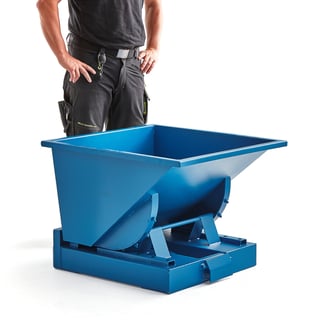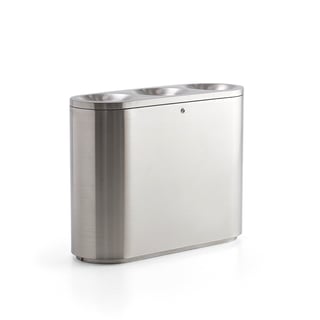
Sorting waste should be easy
Efficient workplace waste management is not just a responsibility but an opportunity to positively impact the environment. Utilising adapted source sorting bins, clearly labeled for different waste facilitates this process seamlessly. Whether it's paper, food waste, or environmentally hazardous materials, ensuring they end up in the correct receptacle facilitates proper recycling practices.
Below, we'll delve into actionable tips aimed at enhancing waste sorting practices within your workplace.
Below, we'll delve into actionable tips aimed at enhancing waste sorting practices within your workplace.
Identify waste sorting needs
Encouraging the recycling of used materials not only benefits the environment but also conserves natural resources. By sorting items like empty packaging, newspapers, and electrical waste at their source, businesses can significantly reduce their ecological footprint.Establishing an effective waste sorting program begins with assessing the volume and types of waste generated within your business. This insight enables the implementation of tailored solutions, such as deploying various collection bins and waste receptacles throughout different departments.
Recognising the unique requirements of different departments enables the customisation of waste management solutions to maximise efficiency and effectiveness.
Different types of recyclable waste
Hazardous waste is, for example, waste oil, treated wood, solvents and various paint and chemical residues.Electrical waste is simply products with a cord or battery. Electronics, fluorescent tubes and batteries also belong here.
Paper and cardboard such as ewspapers, brochures, office paper, and similar items can be recycled to create new paper products.
Plastic packaging for example plastic cans, plastic tubes, plastic bottles and styrofoam.
Glass packaging such as glass bottles and glass jars. They should usually be divided between colored and uncoloured.
Metal packaging that is commonly used is aluminum foil, aluminum molds, cans, caps and lids.
Food waste is simply food scraps that must be collected and can, for example, become biogas and biofertilizer.
Bulky waste is larger items that are not packaging.
Combustible waste is what we call household rubbish in everyday speech. That's where things that can't be recycled end up.
Choice of collection bins
The choice of collection bins for recycling can vary depending on the nature of the business and where the sorting will occur within the premises. The number of people on-site and the volume of waste generated also come into play when determining the most suitable containers.The lunchroom: For a spacious cafeteria, recycling cabinets with different openings for sorting are both a stylish and practical choice. Place several cabinets next to each other for the different types of waste to be sorted. Sorting cabinets with a mixture of bins and drawers are an excellent space-saving option for the smaller dining area. Don't forget about food waste! Set up a compost container where food scraps can be collected in compost bags. This not only reduces waste but also turns food scraps into valuable compost!
The Office: Start by keeping a battery box handy for used batteries from gadgets like computer mouse and keyboards. When it comes to paper recycling, a basic bin does the trick to keep things separate, but if your paper usage is high, consider upgrading to a waste container on wheels for easy maneuvering. In the office kitchen, colour coded bins are perfect for collecting plastic bottles, cans, and other recyclables.
The Warehouse: Tip containers are perfect for efficient sorting of packaging such as cardboard, shrink wrap and plastic, they're designed to be used with forklifts and built to withstand rough handling. To make recycling even easier, consider investing in tip containers in different colors. This helps streamline the process and ensures materials end up in the right place. You can even opt for models with automatic tipping and emptying features.
School: Make it easy for younger kids and students to do their bit for the environment by placing colour coded recycling bins in the classrooms with clear labels.
Simple recycling with clear labels
After setting up your waste containers, it's crucial to label them clearly for easy sorting. Different colored containers send a clear message that recycling is in place. Alternatively, you can use self-adhesive picture stickers to indicate what goes where, effortlessly sticking them onto bins or sorting cabinets.Make sure to position the sorting bins where they're visible and easily accessible. This way, everyone can pitch in and sort correctly, ensuring that recyclable items don't end up with the rubbish!
Emptying and cleaning
Regularly emptying recycling bins is essential and should be as straightforward as filling them up. Overflowing bins and bags dampen enthusiasm for waste sorting despite good intentions. This becomes especially unpleasant if it involves containers with food waste. Establish routines for emptying and cleaning recycling bins to maintain freshness.Opt for waste containers with wheels for easy mobility during emptying, improving efficiency and saving strain on the body. Bag holders with wheels or standard dustbins with handles are excellent options for sorting cabinets.
Once sorted, transport the materials to the appropriate recycling location. If you're unsure about recycling guidelines in your area, reach out to your local council for guidance on waste management and recycling practices.
Recycling is an easy way to help the environment
With a well-organized system for sorting waste at the source, there's a higher likelihood that everything ends up where it belongs. Proper handling of chemicals and hazardous waste is particularly crucial.The more we recycle, the less strain we put on the Earth's resources, and we prevent harmful substances from contaminating nature. By doing our part in recycling, we all contribute to creating a healthier environment for everyone.
If you need more information about our products, you are always welcome to contact us. We are happy to help you!
We can help you recycle..
FAQ
Get the latest product launches and offers sent direct to your inbox
Do you want to receive exclusive offers, information about new products and inspiration on how you can improve your workplace? Sign up for our free newsletter and be the first to receive our best offers.Please wait...
*By clicking subscribe, I confirm that I have read the privacy policy.



















